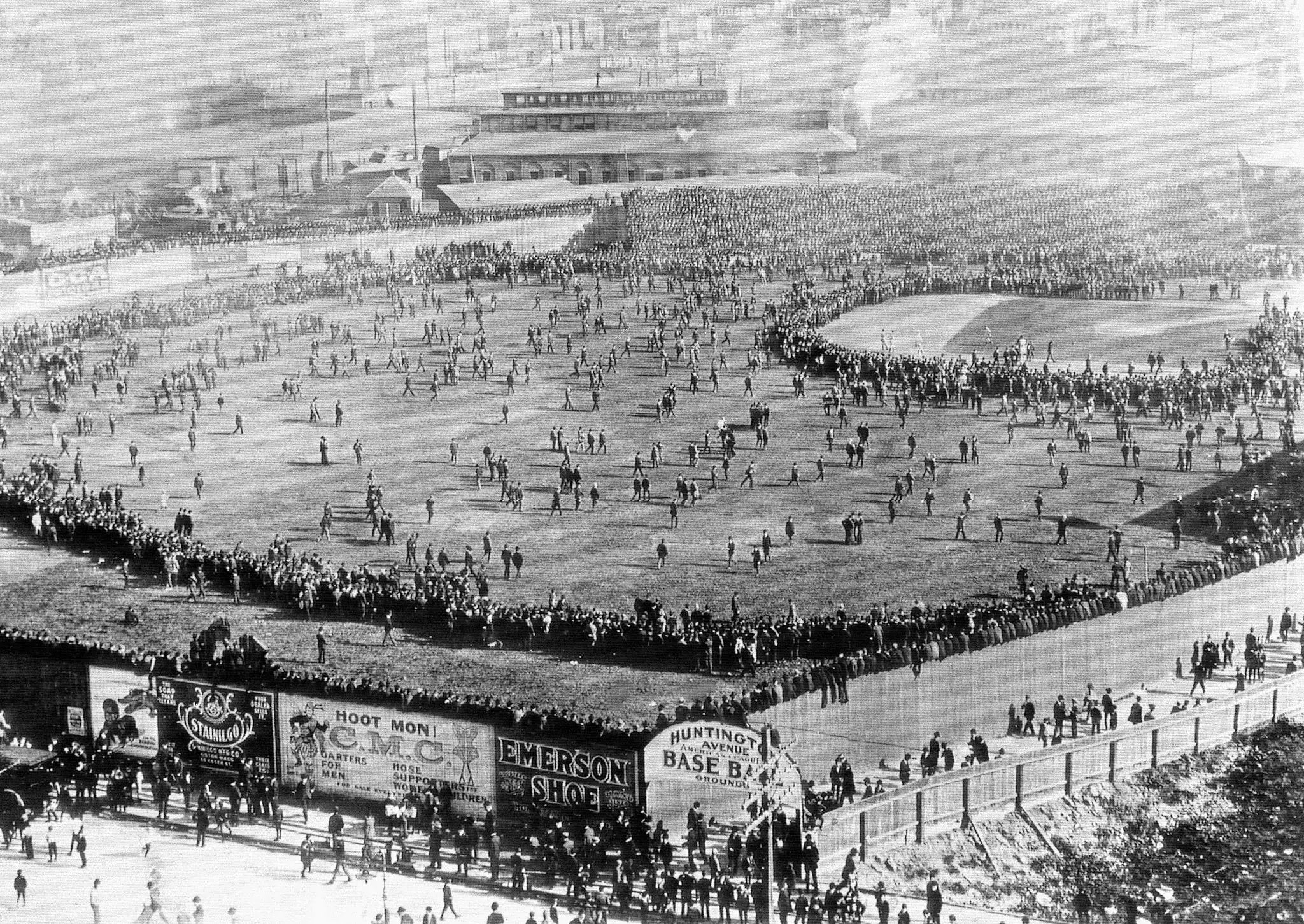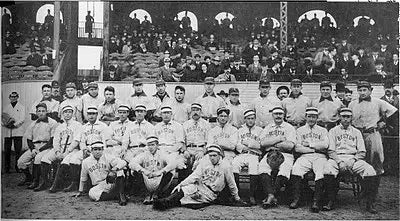On This Date in Sports October 1, 1903 The First World Series
The two leagues come together for the first time to stage a championship in baseball. Called the World Series, the first game is played at the Huntington Avenue Grounds with Cy Young starting the Boston Americans. At the same time, Deacon Phillippe made the start for the National League Champion Pittsburgh Pirates. The Pirates scored four runs in the first and won the opener 7-3, but Boston would win the best-of-nine series 5-3.
Both teams finished with similar records, with the Boston Americans, led by Jimmy Collins, finishing 91-47 to represent the American League, while the Pittsburgh Pirates, managed by Fred Clarke, finished 91-49. The Boston franchise, sometimes called the Pilgrims or Puritans, were called the Americans because they were in the American League. However, a few years later, they officially became the Red Sox.
 Bettmann. Getty Images.
Bettmann. Getty Images.
Cy Young, baseball’s all-time winningest pitcher, got the start for Boston and threw the first pitch in World Series history as Ginger Beaumont, the first batter, flew out to center. Two batters later, Tommy Leach got the first hit in World Series history, a triple. He would also score the first run on a single by Honus Wagner. The Pirates would score four runs in the first, taking advantage of three Boston errors. Jimmy Sebring, who knocked in two runs in the first, drove home the third run to give Pittsburgh a 5-0 lead at the end of three innings. Deacon Phillippe meanwhile cruised for the Pirates, allowing just one hit in the first three innings. The Pirates continued to take advantage of Boston miscues, adding a sixth run in the fourth, as Phillippe put the Americans' bats to sleep. In the seventh inning, Sebring made more World Series history with an inside-the-park home run, the first World Series homer. Boston’s offense finally broke through in the bottom of the seventh, with back-to-back triples by Buck Freeman and Fred Parent. Parent would later score on a sac fly by Candy LaChance. LaChance added a second sac fly in the ninth as Pittsburgh took the opener 7-3.
Boston fared better with Bill Dineen on the mound in Game 2. Dineen allowed just three hits while striking out 11 Pirates as the Americans evened the series with a 3-0 win. Patsy Dougherty supplied the offense, who led off the first with an inside-the-park home run off Sam Leever and later hit the first out-of-the-park home run in World Series history against Bucky Veil. Deacon Phillippe handcuffed Boston again in Game 3, allowing just two runs on four hits as the Pirates won 4-2, with Cy Young pitching seven innings in relief of an ineffective Tom Hughes.
In Game 5, crowd control became a problem at Exposition Park as the Royal Rooters, a loud group of supporters from Boston, arrived to cheer on their team. The Royal Rooters were led by a local bartender nicknamed Nuff Ced McGreevy and counted Boston Mayor John Fitzgerald among their members. John Fitzgerald is better known as the maternal grandfather of John F. Kennedy. The Royal Rooters would often harass opposing players with off-color lyrics sung to the tune of “Tessie,” a popular turn-of-the-century Broadway show tune. The Royal Roosters helped the Americans get back in the series with an 11-2 win as Cy Young earned his first series win. Cy Young was also critical with the bat, driving home two runs with a triple in the sixth as Boston broke open a scoreless game with five runs off Brickyard Kennedy. The game had more triples due in part to the overflow crowd, which resulted in fans standing in the outfield, with balls that rolled under the rope being called a ground-rule triple.
The Royal Rooters continued to harass Pittsburgh as Bill Dineen earned his second World Series win in Game 6. The Americans would even the series with a 6-3 win, as they took control of the game with three runs in the third inning. By now, Boston had all the momentum, and not even Deacon Phillippe could stop it as the Americans got first-inning triples from Jimmy Collins and Chick Stahl to take an early 2-0 lead. The Americans would win the game 7-3, with Cy Young earning the win, to take the series lead 4-3.
Leading 4-3, the series, with the return to Boston for the final two games, with the Americans needing just one win to capture the first World Series. Once again, with two days off between games, the Pirates went back to Deacon Phillippe, while Bill Dineen, seeking his third win, got the start for Boston on October 13th. After the first three innings were scoreless, the Americans broke through in the fourth innings, scoring two runs on a hit by Hobe Ferris. Ferris drove home a third run in the sixth, as Dineen was brilliant for Boston, allowing just four hits while striking out seven, including Honus Wagner, to end the game as the Boston Americans won 3-0 to win the first World Series five games to three.

Playing in the World Series was optional at first. In 1904, John McGraw, the manager of the National League Champion New York Giants, refused to acknowledge the American League Champions from Boston. In 1905, McGraw and the Giants agreed to fall in, and the World Series became an annual event, helping to make baseball the national pastime.


